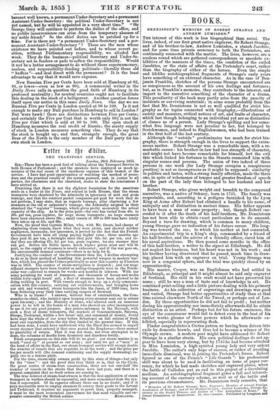rein to tO Mot. THE TRANSPORT SERVICE..
Loudon, 28th February 1855. Sm—There has been a good deal of talking about the Transport Service in both Houses of Parliament ; and the speakers have displayed as much ig- norance of the real cause of the enormous expense of this branch of the service. I have had good opportunities of watching the method of proce- dure and the practical results of the system pursued, and, in justice to all parties, the charterers and the chartered, desire to state the conclusions I have arrived at.
Premising that there is not the slightest foundation for the assertions made in a leader in the Times, and echoed in both Houses, that the steam transports were chartered by the Admiralty in ignorance of nett and gross tonnage, and that the contract packet companies get paid for work they do not perform, I may state, that as regards tonnage, after chartering a few steamers at the old or carpenter's tonnage, the Admiralty adopted as their standard the " register " tonnage, which gives pretty accurately the actual capacity of the ship. As to the price paid—the rate has varied from 40s. to 50s. per ton, gross register, for large steam transports ; no large steamers have been chartered above 50s.; small vessels of 500 to 600 tons have lately been taken up at 55s. and 608.
Now, the proof that Captain Milne, who, with Mr. Grant, bad charge of chartering these vessels, knew what they were about, and showed neither negligence, incapacity, nor ignorance, is proved by the fact that the French Government have been all along paying higher rates : three months ago they paid 31. per ton, a fortnight since they paid 62s. 6d. per ton, and to- day they are offering 678. 6d. per ton, gross register, for any steamer they can get. Before the Baltic opens, much higher prices must and will be paid, as the supply of steamers is nearly exhausted ; and if the war goes on, the unreasonable demand continues—there is no help for it. Justifying the conduct of the Government thus far, I decline attempting
to do so in their method of handling this powerful weapon in modern war- fare, which has placed the Crimea practically as near this country as Flanders was in 1815. The essence of steam-navigation is despatch ; and our mag- nificent steamers have been treated as sailing-transports were in the Penin- sular war—allowed to remain for weeks and months in idleness. With our army perishing for want of transport, and thousands of horses and mules within forty-eight hours' sail, a fleet of steamers have been allowed to lie doing nothing in port. With vessels enough to keep up a daily communi- cation with this country, carrying out reinforcements, and bringing home our sick and wounded, steam transports like the Jason, of 2500 tons, have been frittering away their time carrying cargoes of firewood.
Who is to blame ? I answer, without fear of contradiction, the Com- mander-in-chief, who insisted upon keeping every steamer sent out to attend upon his army ; and the Ministry at home, who allowed such an immense power to be left in the hands of a man who showed an utter incompetence to use it for any good purpose. Any potato-salesman in the Borough, with such a fleet of steam transports, the markets of Constantinople, Smyrna, Sinope, Trebizond, within a few hours' sail, and command of money, would have kept the whole of our army before Sebastopol on full rations of fresh meat and vegetables, from the day they landed to the present time. If this had been done I could have understood why the Black Sea seemed to engulf every steamer lhat entered it that once passed the Bosphorus—there seemed no possibility of return. That it was not done, nor even attempted to be done, the columns of deaths from dysentery and diarrhiea testify. Fresh arrangements on this side will do no good : our steam marine is as
much "used up" at present as our army ; and until we get a "man" at the head of affairs in the East, our steam transport service will occupy double the number of vessels that are requisite to do the work ; and the price per ton per month will (the demand continuing and the supply decreasing) ra- pidly rise to a famine pitch.
For the time, steam-ship owners profit by this state of things—but only for the "time" : and the proof that they think so is, that in the Clyde, the great centre of steam-boat construction, there are not one-half the number of vessels on the stocks that there were last year, and there is a general complaint that no fresh orders are coming in. The true interest of steam-boat owners is that the first application of steam
transport in warfare should be successful, and more economical than the sys- tem it superseded. Of its superior efficacy there can be no doubt ; and if it pays mercantile men to employ steamers to convey their goods to the Levant and Trebizond, it requires no argument to prove that, properly managed, it must be the most economical conveyance for that most valuable and ex-


























 Previous page
Previous page